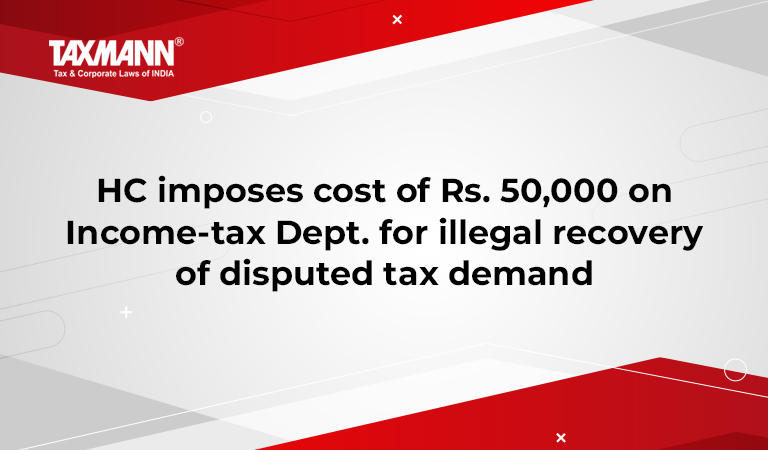HC imposes cost of Rs. 50,000 on Income-tax Dept. for illegal recovery of disputed tax demand
- Blog|News|Income Tax|
- 3 Min Read
- By Taxmann
- |
- Last Updated on 28 May, 2022

Case Details: Rajendra Kumar v. ACIT - [2022] 138 taxmann.com 490 (Rajasthan)
Judiciary and Counsel Details
-
- Prakash Gupta & Sameer Jain, JJ.
- Ankit Totuka, Adv. for the Petitioner.
- Anuroop Singhi & N.S. Bhatia, Advs. for the Respondent.
Facts of the Case
For the Assessment Year 2017-18, the Assessing Officer (AO) passed the assessment order and raised a demand of Rs. 2 crores (approx.). The assessee filed an appeal before the CIT(A) contending that demand wasn’t maintainable.
Later, the CPC issued a refund of Rs. 70 lakh (approx.) for the Assessment Year 2018-19 which was adjusted against the demand for the Assessment Year 2017-18. Further, while processing the return for Assessment Year 2019-20, CPC adjusted the refund with the balance amount of demand.
Assessee filed writ petition before the High Court against such recovery made by the Income-tax Dept.
High Court Held
The Rajasthan High Court held that, in response to the intimation for adjusting refund of Assessment Year 2018-19 with pending demand, the assessee had filed an application for stay of demand. Assessee voluntarily requested the department for adjustment of 20% of demand while granted stay.
However, the AO had taken high-handed action in bye-passing said application and adjusted the entire demand from refunds to be issued to the assessee.
The instant case is a classic example of ‘absolute power corrupts absolutely. The assessee was quite prompt in filing an appeal before the CIT(A) against the assessment order without waiting for 30 days of the statutory time. However, said appeal wasn’t considered by CIT(A) for the reasons best known to him only.
Further, Section 220(6) makes it very clear that once an appeal is filed by the assessee within the time limit, the assessee will not be deemed as an assessee-in-default. Thus, when an appeal of the assessee is pending and the same is not disposed of for reasons beyond his control, on account of autocratic, lethargy, and administrative constraints on the part of the respondents, the recovery of demand pending appeal will be an act in terrorem.
AO submitted that no application for waiver of recovery and stay of demand was filed along with appeal. It should be noted that unlike the provisions of Section 129(e) of the Customs Act, 1962 and the provisions of Section 235(f) of the Central Excise Act, there is no mandatory requirement of pre-deposit for entertaining the appeal under the Income-tax Act.
The Revenue for its own default of not considering the appeal in time even after a lapse of one and half years has initiated recovery dehors not only the statutory provisions and the judgments of the higher forums but even contrary to its own office memorandum which permits recovery only to the extent of 20%.
Accordingly, the writ petition was to be allowed, and AO was directed to issue a refund along with interest in excess of 20% of demand. Furthermore, it was a fit case to impose a cost upon the Income-tax Dept. which is quantified to Rs. 50,000.
The tax Department shall pay itself or if it so chooses, the same may be recovered equally from AO. Said sum is to be deposited with the Rajasthan State Legal Services Authority, Jaipur, and assessee in half and half within two months of the passing of this order.
Disclaimer: The content/information published on the website is only for general information of the user and shall not be construed as legal advice. While the Taxmann has exercised reasonable efforts to ensure the veracity of information/content published, Taxmann shall be under no liability in any manner whatsoever for incorrect information, if any.

Taxmann Publications has a dedicated in-house Research & Editorial Team. This team consists of a team of Chartered Accountants, Company Secretaries, and Lawyers. This team works under the guidance and supervision of editor-in-chief Mr Rakesh Bhargava.
The Research and Editorial Team is responsible for developing reliable and accurate content for the readers. The team follows the six-sigma approach to achieve the benchmark of zero error in its publications and research platforms. The team ensures that the following publication guidelines are thoroughly followed while developing the content:
- The statutory material is obtained only from the authorized and reliable sources
- All the latest developments in the judicial and legislative fields are covered
- Prepare the analytical write-ups on current, controversial, and important issues to help the readers to understand the concept and its implications
- Every content published by Taxmann is complete, accurate and lucid
- All evidence-based statements are supported with proper reference to Section, Circular No., Notification No. or citations
- The golden rules of grammar, style and consistency are thoroughly followed
- Font and size that’s easy to read and remain consistent across all imprint and digital publications are applied



 CA | CS | CMA
CA | CS | CMA
